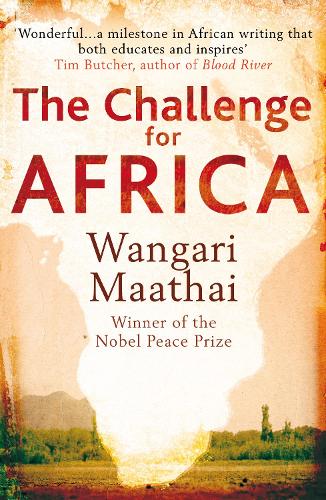
The Challenge for Africa
(Paperback)
Publishing Details
The Challenge for Africa
By (Author) Wangari Maathai
Cornerstone
Arrow Books Ltd
1st June 2010
1st April 2010
United Kingdom
Classifications
Professional and Scholarly
Non Fiction
Social and cultural anthropology
338.96
Physical Properties
Paperback
336
Width 130mm, Height 198mm, Spine 20mm
270g
Description
Nobel Peace Prize-winner Wangari Maathai offers a manifesto for C21st Africa. In this urgent yet optimistic new work, Nobel Peace Prize Winner Wangari Maathai provides a unique perspective on the fate of Africa. Informed by her three decades as an environmental activist and campaigner for democracy, The Challenge for Africa celebrates the enduring potential of the human spirit, and reminds us that change is always possible.
Reviews
I hope the world will support her vision of hope -- Nelson Mandela
From one of Africa's most positive and far-sighted thinkers comes a wonderful book combining an elegant critique of Africa's troubled past with a rallying cry for how Africans can use culture, nature and self-belief to reverse their continent's decline. The Challenge for Africa is a milestone in African writing that both educates and inspires -- Tim Butcher
Penetrating. . . a 21st century manifesto for Africans, drawing on her own experience as a worldly Kenyan, street-fighting activists, member of parliament and, from 2003-2006, government minister. Her analysis is thorough. She reaches into African history, culture, psychology, contemporary politics and fragile ecosystems * Financial Times *
Like a Nelson Mandela or a Mahatma Gandhi, Maathai stands way above most mortals * The Guardian *
Wangari Maathai is a prophet for our time -- Alexandra Fuller
Author Bio
Wangari Muta Maathai was born in Nyeri, Kenya, in 1940. She is the founder of the Green Belt Movement, which, through networks of rural women, has planted over 30 million trees across Kenya since 1977. In 2002, she was elected to Kenya's Parliament in the first free elections in a generation, and served as Deputy Minister for the Environment and Natural Resources. She was awarded the Nobel Peace Prize in 2004 in recognition of her campaigns for democracy and environmental reform during the dictatorship of Daniel arap Moi. She died in 2011.
